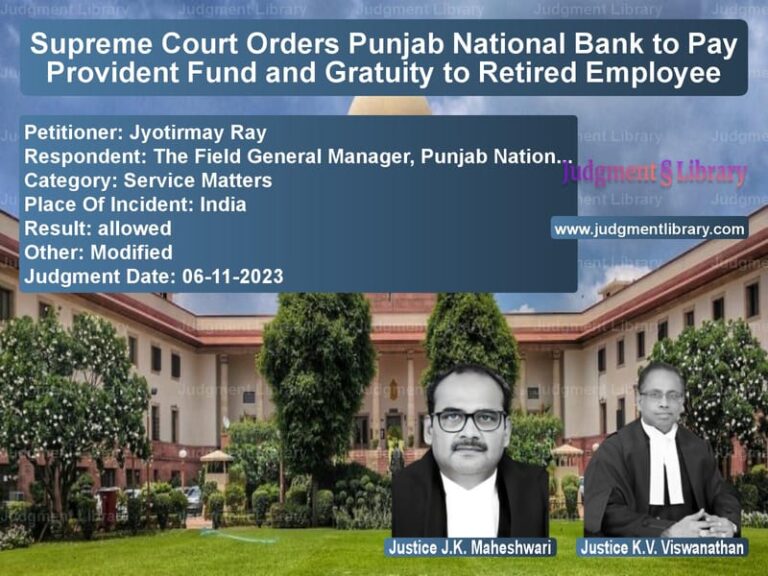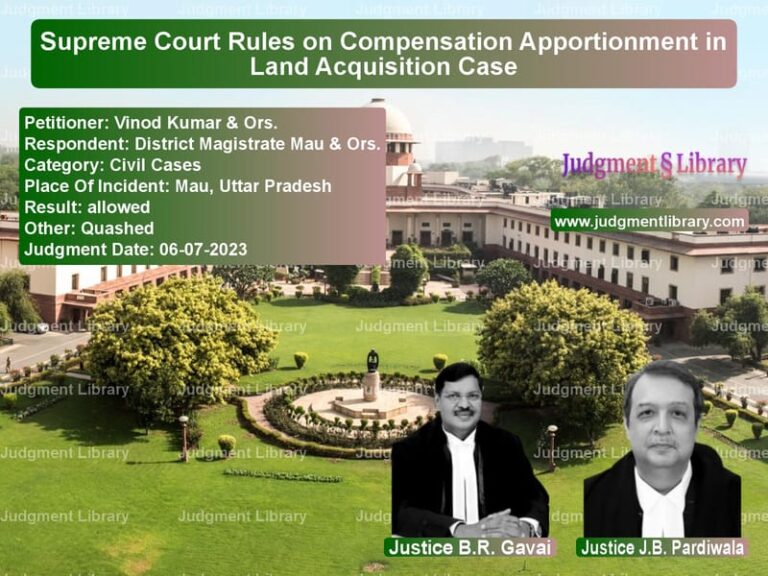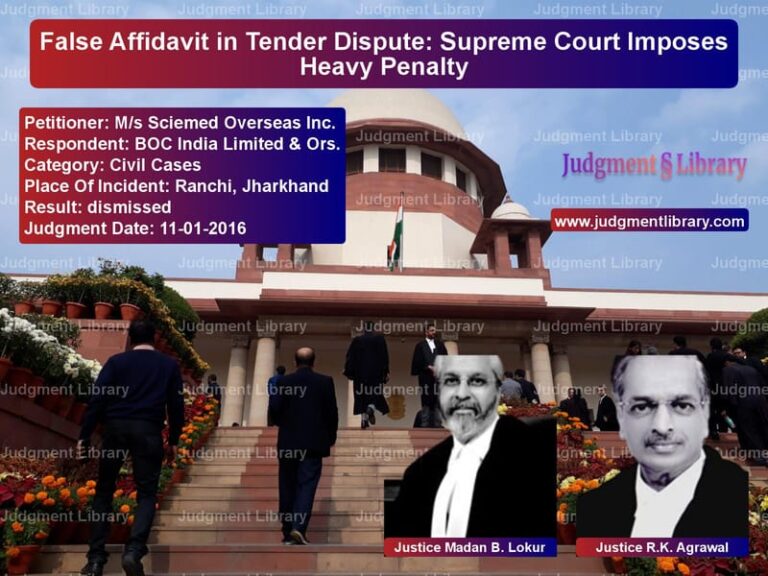Review Petition in Criminal Acquittal Case Dismissed: Supreme Court Reinforces Limited Scope of Review
The Supreme Court of India recently delivered a significant ruling in the case of Indra Deo Tiwari vs. State of U.P. & Ors., affirming the acquittal granted by the Trial Court and upheld by the High Court. This case involved a review petition challenging the dismissal of a Special Leave Petition (SLP) seeking reversal of an acquittal. The Supreme Court dismissed the review petition, reinforcing the principle that review petitions in criminal cases can only succeed if there is a clear and apparent error.
The judgment has broader implications for criminal jurisprudence in India, as it clarifies the scope of judicial review and the finality of acquittals. The Supreme Court’s decision to reject the petitioner’s request for an oral hearing also highlights the Court’s firm stance on preventing repetitive appeals and misuse of judicial resources.
Background of the Case
Indra Deo Tiwari, the appellant, was the complainant in a criminal case where the accused had been acquitted by the Trial Court. Dissatisfied with the verdict, he approached the High Court, which also upheld the acquittal. Further challenging the decision, the complainant filed a Special Leave Petition (SLP) before the Supreme Court. However, the Supreme Court dismissed the SLP after hearing both sides.
Following the dismissal of the SLP, the complainant filed a review petition, arguing that there was an apparent error in the Supreme Court’s decision, and sought reconsideration. The primary contention was that the lower courts had overlooked critical evidence and misinterpreted legal provisions, leading to a miscarriage of justice.
Key Legal Issues Before the Supreme Court
- Whether the review petition disclosed an apparent error in the judgment.
- Whether the Supreme Court should intervene after both the Trial Court and the High Court upheld the acquittal.
- The scope of a review petition in criminal matters.
- The legal principles governing finality in criminal cases.
Arguments Presented
Petitioner’s (Indra Deo Tiwari) Arguments
- The petitioner argued that the Trial Court and the High Court had failed to consider crucial evidence, leading to an erroneous acquittal.
- He contended that the Supreme Court, while dismissing the SLP, had overlooked significant legal errors that warranted reconsideration.
- The petitioner sought an oral hearing, asserting that his grievances had not been fully addressed in previous proceedings.
- He maintained that the Supreme Court had the power to review its own decision if it was demonstrated that an error apparent on record existed.
Respondent’s (State of U.P. & Others) Arguments
- The respondents argued that the review petition did not meet the legal threshold for reconsideration.
- They contended that no error apparent on record had been demonstrated, which is a mandatory requirement for review under Article 137 of the Constitution of India.
- The acquittal had been upheld by two lower courts after considering all material evidence, and no new facts or legal grounds had been presented in the review petition.
- The respondents emphasized that the petitioner was engaging in judicial overreach by seeking multiple reviews of a settled matter.
Supreme Court’s Observations and Ruling
1. No Error Apparent on Record
The Supreme Court reviewed the grounds of the petition and found that no substantial error had been demonstrated. The ruling stated:
“We have gone through the grounds taken in the Review Petition and do not find any error apparent on record to justify interference.”
The Court reiterated that a review petition is not an appeal, and it cannot be used to reargue a case that has already been decided on merits.
2. Oral Hearing Application Rejected
The petitioner had sought an oral hearing to present his case, but the Court declined this request. The judgment emphasized:
“Application for Oral Hearing in the Review Petition is rejected.”
The Supreme Court clarified that a review petition is not a fresh hearing but a limited examination of an apparent error.
3. Affirmation of Acquittal
The Court upheld the decisions of the Trial Court and the High Court, reinforcing the principle that acquittals should not be overturned without compelling reasons. The ruling stated:
“The acquittal recorded by the Trial Court was challenged by the complainant – present review petitioner before the High Court. After considering the entire material on record, the acquittal was affirmed by the High Court. The Special Leave Petition arising therefrom, at the instance of the Review Petitioner, was dismissed after hearing both sides.”
Impact of the Judgment
The ruling has significant legal implications:
1. Reinforcing the Limited Scope of Review Petitions
The decision reaffirms that review petitions in criminal cases can only succeed if there is a clear and apparent error. The judgment prevents unnecessary litigation and ensures judicial efficiency.
2. Strengthening the Finality of Acquittals
The Supreme Court has once again emphasized that once an acquittal has been upheld at multiple judicial levels, it should not be easily disturbed. This principle protects the rights of accused persons and upholds the sanctity of judicial decisions.
3. Restricting Repetitive Appeals
The ruling discourages unnecessary review petitions, ensuring that judicial resources are used efficiently. The judgment sends a strong message against the misuse of review jurisdiction for re-litigating settled matters.
Precedents and Legal Framework
The Supreme Court’s ruling is consistent with previous judgments that have established the limited scope of review petitions:
- Union of India vs. Sandur Manganese & Iron Ores Ltd. (2013) – Held that a review petition must demonstrate an error apparent on the face of the record.
- Kamlesh Verma vs. Mayawati (2013) – Clarified that a review petition is not an opportunity to reargue a case.
- Rupa Ashok Hurra vs. Ashok Hurra (2002) – Defined the scope of curative petitions in cases of gross miscarriage of justice.
Conclusion
The Supreme Court’s decision in Indra Deo Tiwari vs. State of U.P. & Ors. sets an important precedent regarding the limited scope of review petitions in criminal cases. By upholding the acquittal and dismissing the review petition, the Court has reinforced the principle of finality in judicial decisions, ensuring that only genuine cases of error are reconsidered. The ruling strengthens the legal framework governing criminal reviews and protects the judicial system from being burdened by repetitive appeals.
Petitioner Name: Indra Deo Tiwari.Respondent Name: State of U.P. & Ors..Judgment By: Justice Uday Umesh Lalit, Justice S. Ravindra Bhat.Place Of Incident: Uttar Pradesh.Judgment Date: 04-05-2022.
Don’t miss out on the full details! Download the complete judgment in PDF format below and gain valuable insights instantly!
Download Judgment: indra-deo-tiwari-vs-state-of-u.p.-&-ors.-supreme-court-of-india-judgment-dated-04-05-2022.pdf
Directly Download Judgment: Directly download this Judgment
See all petitions in Bail and Anticipatory Bail
See all petitions in Judgment by Uday Umesh Lalit
See all petitions in Judgment by S Ravindra Bhat
See all petitions in dismissed
See all petitions in supreme court of India judgments May 2022
See all petitions in 2022 judgments
See all posts in Criminal Cases Category
See all allowed petitions in Criminal Cases Category
See all Dismissed petitions in Criminal Cases Category
See all partially allowed petitions in Criminal Cases Category







